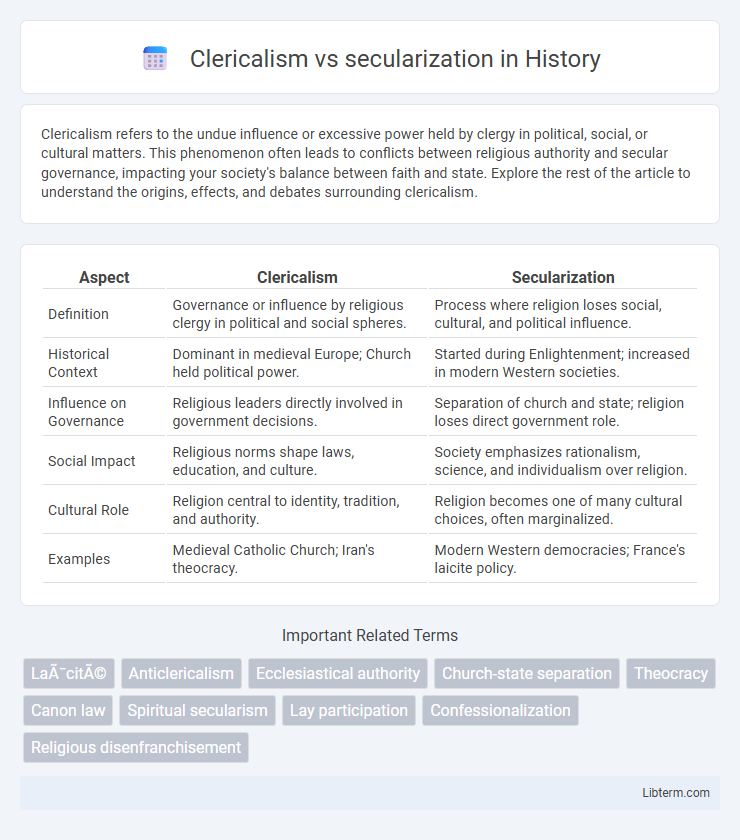Clericalism refers to the undue influence or excessive power held by clergy in political, social, or cultural matters. This phenomenon often leads to conflicts between religious authority and secular governance, impacting your society's balance between faith and state. Explore the rest of the article to understand the origins, effects, and debates surrounding clericalism.
Table of Comparison
| Aspect | Clericalism | Secularization |
|---|---|---|
| Definition | Governance or influence by religious clergy in political and social spheres. | Process where religion loses social, cultural, and political influence. |
| Historical Context | Dominant in medieval Europe; Church held political power. | Started during Enlightenment; increased in modern Western societies. |
| Influence on Governance | Religious leaders directly involved in government decisions. | Separation of church and state; religion loses direct government role. |
| Social Impact | Religious norms shape laws, education, and culture. | Society emphasizes rationalism, science, and individualism over religion. |
| Cultural Role | Religion central to identity, tradition, and authority. | Religion becomes one of many cultural choices, often marginalized. |
| Examples | Medieval Catholic Church; Iran's theocracy. | Modern Western democracies; France's laicite policy. |
Understanding Clericalism: Definition and Origins
Clericalism refers to the influence and dominance of clergy in political and social spheres, often resulting in the prioritization of religious authority over secular governance. Originating in medieval Europe, clericalism emerged from the Church's consolidation of power, blending spiritual leadership with temporal control. This concept opposes secularization, which advocates for the separation of religious institutions from governmental and public affairs.
The Rise of Secularization in Modern Societies
The rise of secularization in modern societies marks a significant decline in clericalism, characterized by the reduced influence of religious institutions on political and social affairs. Empirical data from advanced industrial nations show decreased church attendance and diminished authority of religious leaders in policymaking. This trend correlates with increased emphasis on scientific reasoning, individual autonomy, and pluralistic values shaping contemporary governance and cultural norms.
Key Differences Between Clericalism and Secularization
Clericalism refers to the undue influence or dominance of clergy in political, social, or cultural affairs, often prioritizing religious authority over secular governance. Secularization describes the process by which religion loses social and cultural significance, leading to the separation of church and state institutions. The key difference lies in clericalism emphasizing religious control and intervention, whereas secularization promotes diminishing religious involvement in public life and policymaking.
Historical Context: Clerical Power vs Secular Movements
Clericalism historically embodied the dominance of religious authorities in political and social spheres, particularly evident during the Middle Ages when the Catholic Church controlled vast territories and influenced monarchies across Europe. Secularization gained momentum with the Enlightenment and the rise of nation-states, challenging clerical power by promoting rationalism, individual rights, and the separation of church and state. Key events such as the French Revolution and the subsequent decline of Papal temporal influence marked turning points where secular movements systematically reduced clerical authority in governance and public life.
Impact of Clericalism on Religious Institutions
Clericalism deeply influences religious institutions by concentrating authority within the clergy, often limiting lay participation and fostering hierarchical control. This centralization can lead to resistance against secularization, as clerical elites prioritize preserving doctrinal purity and institutional power. Such dynamics contribute to tensions between religious tradition and modern secular values, shaping the evolution and societal role of faith-based organizations.
Secularization’s Influence on Social and Cultural Norms
Secularization profoundly reshapes social and cultural norms by reducing the influence of religious institutions in public life and governance, leading to more pluralistic and diverse societies. This process fosters values such as individual autonomy, scientific reasoning, and secular ethics, which often challenge traditional clerical authority and religious dogma. As secularization advances, social policies increasingly reflect secular principles, emphasizing human rights, gender equality, and freedom of expression over religious mandates.
Clericalism and Secularization in Contemporary Politics
Clericalism in contemporary politics manifests as the undue influence or control of religious leaders over political decision-making, often blurring the separation between church and state. Secularization challenges this influence by promoting the reduction of religious authority in public institutions and advocating for governance based on rational-legal frameworks rather than religious doctrines. The ongoing tension between clericalism and secularization shapes policy debates on education, human rights, and lawmaking, impacting democratic governance and pluralism worldwide.
The Role of Education in Promoting Secularization
Education plays a pivotal role in promoting secularization by fostering critical thinking, scientific inquiry, and a separation of religious doctrines from state policies. Schools and universities emphasize secular curricula that encourage students to question traditional religious beliefs and embrace pluralistic worldviews. Empirical studies demonstrate that higher levels of education correlate with increased secular attitudes and diminished clerical influence in public life.
Challenges and Criticisms Facing Clericalism Today
Clericalism faces significant challenges due to increasing secularization, which promotes the separation of religious authority from governmental and social institutions, leading to reduced influence of clergy in public affairs. Critics argue that clericalism fosters power imbalances, undermines democratic processes, and resists modernization, causing tensions between religious institutions and secular societies. The ongoing push for pluralism and individual autonomy intensifies calls for transparency and accountability within religious leadership, highlighting clericalism's struggle to adapt in contemporary pluralistic contexts.
Future Prospects: Navigating Between Clericalism and Secularism
Future prospects for societies navigating between clericalism and secularization involve balancing religious authority with secular governance to foster social cohesion and political stability. Increasing globalization and digital communication propagate diverse worldviews, challenging traditional clerical influence while promoting secular values of pluralism and individual rights. Emerging trends suggest adaptive frameworks integrating ethical principles from both clerical and secular domains to address complex issues such as education, public policy, and human rights.
Clericalism Infographic

 libterm.com
libterm.com